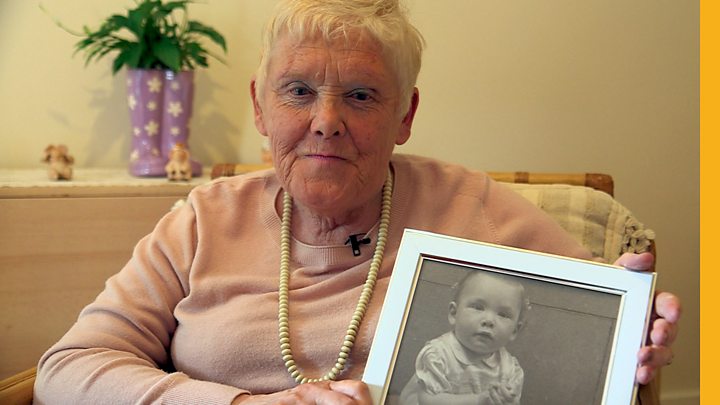
Doctors in the UK routinely lied to patients with disorders of sex development known as intersex conditions, the BBC has found.
A leading paediatric consultant told BBC Radio 4 that withholding the truth of patients’ diagnoses had been “widespread”.
Jeanette, now 71, was operated on at the age of 16 to remove her hidden testes.
She discovered the truth only when she was 50.
Jeanette was born with complete androgen insensitivity (CAIS), a genetic disorder occurring in between one in 20,000 and one in 60,000 births.
A child born with CAIS is genetically male but their body does not respond to the hormone testosterone properly, so the external appearance of their genitals will look entirely female.
Jeanette was 12 when doctors told her mother that Jeanette would not develop like other girls or be able to have a baby.
Jeanette says: “I couldn’t understand at that point why she [my mum] was crying and what was wrong with me.
“Then, at 14, I started realising that things were not right with me, as I never had periods or anything.”
Two years later, aged 16, Jeanette was taken to hospital and operated on, still unaware of her diagnosis.
At that time, she was told nothing – just that she needed major surgery.
“I’ve got an 8in [20cm] scar right across my stomach. I was feeling perfectly healthy and I can remember sitting up in up in bed, thinking, ‘What the hell am I doing here?'”
Surgeons had removed internal testes from Jeanette’s body, but Jeanette didn’t even know she had them and doctors didn’t tell her why they had operated.
Life became very difficult for Jeanette.
At 28, she got married but found sex with her husband too painful. “I was in so much pain afterwards I couldn’t walk.
“So my mother came with me to hospital and they told me, ‘Go home, things will get better.'”
She left her partner two years later, saying she was too “frightened” to have another physical relationship.
She did not find out the truth about her medical history until she was 50, when saw the words “testicular feminisation”, another term for CAIS, on the front her medical file by chance at an outpatient appointment.
She talked with her GP, who then gave her her medical records to read.
“I read my notes and that’s when it said I had the womb the size of a matchstick and two fully grown testes, and I cried my eyes out.”
Intersex
- There are more than 40 congenital variations of disorders of sex development
- Intersex is an umbrella term used to describe people born with sex characteristics (including genitals, gonads and chromosome patterns) that do not fit into the typical notions of female or male bodies
- Some traits are visible at birth, others not until puberty and some variations in chromosomes may not be physically apparent at all
- Worldwide, up to 1.7% of people have intersex traits, according to the Office of the United Nations High Commissioner of Human rights
Ieuan Hughes, emeritus professor of paediatrics at the University of Cambridge and an expert in hormone disorders, says cover-ups used to be routine in cases such as this.
“In those days the consensus in the medical profession was that the truth would not be disclosed to the patient… and the general advice was for parents not to disclose the true diagnoses to the children.
Image copyright
chameleonseye/Getty
“The explanation for why the person could not have periods, could not have children – a story was spun that the ovaries had not developed properly and were at risk of developing cancer, therefore they needed to be removed.”
He says a number of women who had been told “a pack of lies” by the medical profession have since contacted the Androgen Insensitivity Syndrome Support Group (AISSG), with which he works.
“Apparently there had been a couple of examples where patients had been so upset they had taken their own lives – sadly.”
A AISSG representative told the BBC the practice of routinely withholding the truth from patients didn’t stop until 2012.
British Association of Paediatric Urologists president Stuart O’Toole said most patients were now managed within a team, with input from specialist surgeons and medics and psychologists.
“The parents of the child are involved at every stage.
“Irreversible surgery is rarely performed in infancy, and a gonad would be removed only if there was a credible risk of cancer.”
The British Medical Association, the doctors union, declined to comment, but General Medical Council chief executive Charlie Massey said: “Medical practice has evolved dramatically over the last 50 years, with more and more emphasis on working in partnership with patients, openly and honestly.
“Our guidance makes it clear doctors should involve children and young people as much as possible in discussions about their care, even if they are not able to make decisions on their own.
“We are clear that doctors should not withhold information from patients, unless they believe that giving it would cause the patient serious harm.”
Holly Greenbury, who co-founded Intersex UK, a campaign group founded to end stigma around intersex variations and to fight for equality and protection of intersex people, told BBC Radio 4 that some families were still feeling forced to make decisions over surgery in the UK, before children were of an age at which they could make an informed decision and consent themselves.
“What this highlights is that there is a break down of communication, a lack of education and, currently, the UK is not following internal human rights law and ensuring that our legislation protects the future wellbeing and the bodily autonomy of infants and young children.”
Malta became the first country to outlaw non-consensual medical interventions on intersex, in 2015.
Intersex UK is one of several British organisations now lobbying for corrective surgery to be outlawed in the UK.
Intersex patients ‘routinely lied to by doctors’

